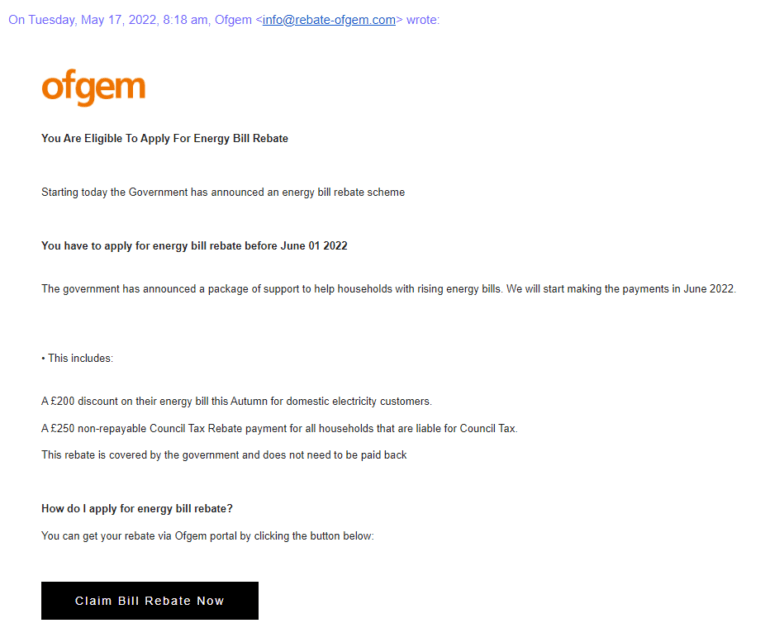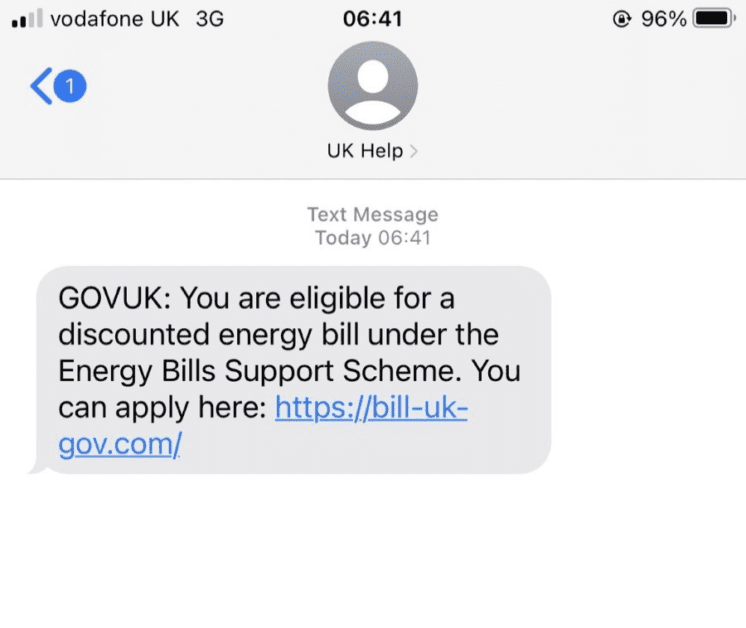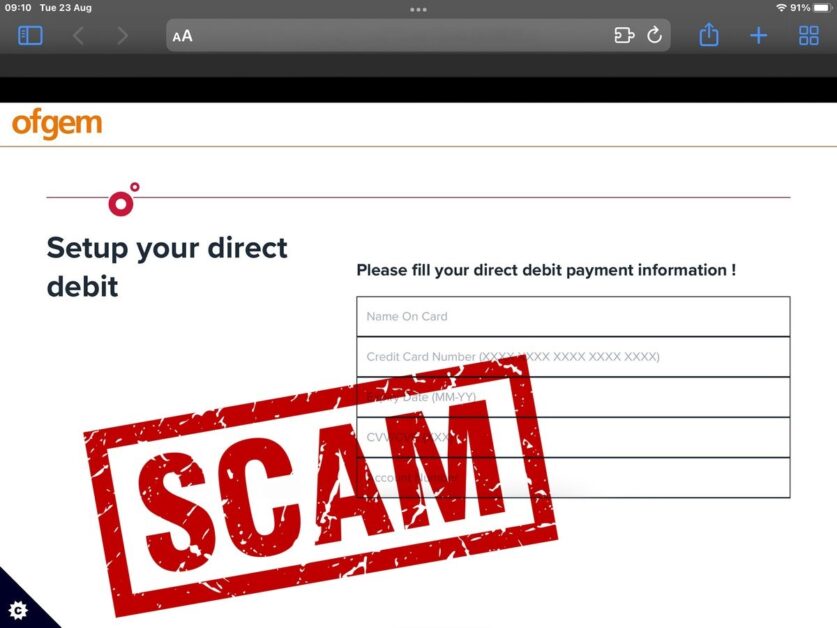Energy bills have been hitting the headlines often over the past year, and the energy industry has seen the introduction of several new laws and regulations. As a result, there has been an increase in energy scammers claiming they are from Ofgem.
Scammers are looking to take advantage of the current financial climate and government support packages to dupe unsuspecting victims into handing over their personal details.
In this article, we’ll discuss some of the recently discovered scams, how to spot them, and how to stay safe.
Rebate Scheme Scams

In the two weeks between Monday, August 22, and Monday, August 5, 2022, a total of 1,567 phishing emails linked with this scam were reported to Action Fraud using the Suspicious Email Reporting Service. The UK’s national fraud and cyber reporting centre have also said it has received more than 750 reports in four days about fake Ofgem emails.
The reported scam emails in this case give links for the recipient to use to submit an application for an energy rebate and make the claim that the recipient is entitled to the refund as part of a government programme. The emails’ links go to malware websites meant to steal sensitive data, including financial and personal information.
‘Claim your bill refund immediately’ is the topic heading on every reported email, and the scammers are utilising the Ofgem logo and colours to make the email look legitimate.
Which? did an investigation into the scam, and found that the fake emails they’ve seen come from:
The link in the email directs you to a fake portal to harvest your details. Anyone providing these details to the scam site is likely to find their card fraudulently debited and would also be at grave risk of their identity and online accounts being taken over.
The fake website – rebate-ofgem.com – prompted urgent warnings from the real Ofgem earlier this year.
An Ofgem spokesperson has said:
“Genuine organisations won’t mind you calling back; only scammers apply pressure and insist you hand over details immediately. If you have any doubts about a message, consumers should contact the organisation directly and not use the numbers or address in the message – use the details from their official website.”
How do I spot if an email from Ofgem is a scam?
Ofgem emphasised that it “would never ask for your bank data with reference to energy bills” after being made aware of the scam on Twitter.
Emails from the regulator that are legitimate will always end in “@ofgem.gov.uk.”
Text
Another identical fraud was delivered by text message.
The fraudulent text message is sent as “UK Help” and promises assistance in the midst of the current cost of living crisis.
The text message reads: “GOVUK: You are eligible for a discounted energy bill under the Energy Bill Support Scheme. You can apply here.”
As British citizens fret over growing energy prices, the text also has a link that contains the term “gov”.
The link directs you to a website where fraudsters can steal your personal information and financial information rather than the official government website.
It’s important to note that any texts requesting information are scams; you do not need to apply for the £400 refund because it will be sent to you immediately.

How do I spot if a text from Ofgem is a scam?
There are a few giveaways about the message that indicate it is a scam, that you can use to spot any scams in the future.
First, the web address this text message is directing people to is a .com domain. Ofgem operates a .gov.uk domain. This is a subtly giveaway and one many people may not notice at first glance.
Second, misinformation. There is no requirement to apply for the £400 energy rebate/discount. It will automatically be added to your energy account or prepayment meter from October onwards. If you haven’t already you should soon receive an email from your energy provider outlining what happens next and how money will be allocated.
Direct Debit Rebate Scam
Just a month ago, Ofgem shared on their twitter account that they have received multiple reports that thieves are emailing consumers saying they’re from Ofgem & asking for direct debit details to refund the winter energy repayment.

If you are ever asked to input personal information by Ofgem, it’s a scam. Ofgem will never sell you energy, ask for personal information, or come to your property.
Winter Rebate Scheme – The Facts
The £400 non-repayable energy discount will be distributed by the UK government in six instalments, with families receiving £66 in October and November and £67 every month from December to March 2023.
If you have a direct debit set up or use a credit card to pay, the funds will be directly deposited to your energy account, lowering the amount you must pay.
Customers with “smart” prepayment metres will have the funds added to their metres each month, requiring them to provide less credit.
During the first week of every month, the provider will send “Special Action Messages” or coupons to customers who have traditional, “non-smart,” prepayment devices.
The discounts will be applied to the metre key when the vouchers are redeemed at top-up locations like a neighbourhood post office. Therefore, it’s critical that your provider has your most recent, accurate contact information.
What to do if you receive a scam email or text?
Ofgem lists out a step-by-step list of what to do if you receive a suspicious email from them, consisting of three main points.
- STOP – Reject, refuse or ignore contact from ‘Ofgem’ that looks or sounds unusual, such as a request for your bank or personal details. We never ask for this information.
- CHECK – Check email addresses. Any emails to or from Ofgem always end @ofgem.gov.uk. Check branding. The Ofgem logo will always be present in our communications. It should never look stretched, blurry or distorted.
- PROTECT – Only criminals will try to rush or panic you. Contact your bank immediately if you think you’ve fallen for a scam. Report it to Action Fraud if you live in England or Wales, and Police Scotland in Scotland.
Of course, if you are unsure about a message you’ve received from Ofgem, you can reach out to us and we can verify its legitimacy to ensure your energy is protected.
What can you do if you think you’ve been scammed?
Here is a list of actions to do if you believe you have been defrauded:
- If you’ve already responded to a scam, cut off all contact right away.
- Call your bank directly to stop any regular payments; alternatively, you can use the 159 hotline for speed and convenience.
- Call Action Fraud at 0300 123 2040 to report the fraud to the police, or report a scam on the Action Fraud website in an anonymous manner. If you live in Scotland, you may report a fraud by calling Advice Direct Scotland at 0808 164 6000 or by visiting their website. Scams can also be reported to Police Scotland by dialling 101.
If you’ve shared sensitive information with the wrong person, it’s best to take action as soon as you can.
- If you’ve given your financial details to someone, contact your bank immediately.
- If you’ve shared your login details, especially a password, change it right away.
